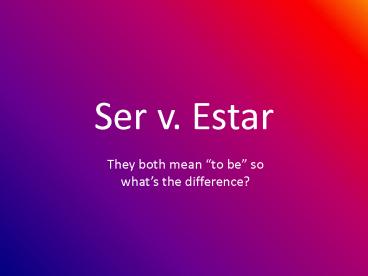Ser v' Estar - PowerPoint PPT Presentation
1 / 18
Title:
Ser v' Estar
Description:
(I am sad.) Ella est contenta porque recibi unas flores de su novio. ... to be bored. ser bueno. to be good. estar bueno. to be tasty/attractive. ser cansado ... – PowerPoint PPT presentation
Number of Views:51
Avg rating:3.0/5.0
Title: Ser v' Estar
1
Ser v. Estar
They both mean to be so whats the difference?
2
Ser - definition
- Ser is used to classify and identify permanent or
lasting attributes. - Think of the acronym DOCTOR
- Description, Occupation, Characteristic,
Time, Origin, and Relationship.
3
1. Description
- For description, think of what you would say if
someone asked you "Whats he like?" These are the
essential qualities that define a person and
probably wont change. They can be a name or a
physical description. - Yo soy Raúl. (I am Raúl.)
- Yo soy alta, morena, y delgada. (I am tall,
dark-skinned, and thin.)
4
2. Occupation
- Occupations are seen as life-long careers and are
therefore seen as more "permanent" than many
people would think in the United States. - Soy profesora del español. (I am a Spanish
teacher.) - Éllos son estudiantes. (They are students.)
- Mi padre era jardinero. (My father was a
gardener.)
5
3. Characteristic
- Characteristics are personality descriptions of a
person. These would probably be the second thing
you say to "Whats he like?" - Amalia es inteligente, atrevida, y amable.
(Amalia is intelligent, daring, and friendly.) - Mi esposo es romántico y cariñoso. (My husband is
romantic and caring.)
6
4. Time
- Time includes days, dates, and hours. For hours,
use es for one oclock and son for all other
hours. - Hoy es miércoles. (Today is Wednesday.)
- Ayer fue mi cumpleaños. (Yesterday was my
birthday.) - Ahora es la una y media. (Right now its one
thirty.) - Son las cinco y veinticinco. (Its five twenty
five.)
7
5. Origin
- As the place a person is from or the material
something is made from is not going to change we
use ser for origin. - Celia es de España. (Celia is from Spain.)
- Adela es peruana. (Adela is Peruvian.)
- Mi anillo es de oro. (My ring is gold.)
8
6. Relationship
- Even after someone dies or someone breaks up,
relationships are described using ser. - Lynne es mi madre. (Lynne is my mother.)
- Marcos es mi ex-novio. (Marcos is my
ex-boyfriend.) - Andrés es católico. (Andrés is Catholic.)
9
Estar - definition
- Estar is used to indicate temporary states and
locations. If the general rule doesnt suffice,
think of the acronym PLACE, which stands for
Position, Location, Action, Condition, and
Emotion.
10
1. Position
- Position is the physical position or posture a
person or thing is in. - Mi abuela está sentada. (My grandmother is
sitting down/seated.) - Yo estaba acostada cuando me llamaste. (I was
lying down when you called me.)
11
2. Location
- The location of someone or something describes
where it is permanently, temporarily, actually,
or conceptually. - El baño está a la derecha de la sala. (The
bathroom is to the right of the living room.) - Estamos en el café ahora y estarémos en el cine
en 20 minutos. (We are at the café right now and
we will be at the movie theatre in 20 minutes.) - Mi abuelo está en la luna. (My grandfather is out
of it/lost.)
12
ONE EXCEPTION for location!!
- Exception for Parties
- This is a big one! The location of an event or
party is described using SER. Not ESTAR! - La fiesta es en mi casa. (The party is at my
house.)
13
3. Action
- Estar is used to describe an ongoing action using
the present progressive tense. - Estoy lavando los platos sucios. (I am washing
the dirty dishes.) - Estamos leyendo los periódicos. (We are reading
the newspapers.) - Mi bisabuelo está muerto. (My great-grandfather
is dead.) - Death is not considered a permanent state
14
4. Condition
- Physical and mental conditions are described
using estar. - Estoy tan cansada esta mañana. (I am so tired
this morning.) - Mis niños están enfermos hoy. (My children are
sick today.) - Mi madre está un poca loca. (My mother is
(acting) a little crazy.)
15
5. Emotion
- How a person is feeling at a certain moment is
described using estar. - Estoy triste. (I am sad.)
- Ella está contenta porque recibió unas flores de
su novio. (She is happy because she received some
flowers from her boyfriend.)
16
Meanings change w Ser v. Estar
17
Practiquemos!
Choose the correct conjugation and write the
correct rule.
- La cena (es/está) en la mesa.
- (Son/Están) las siete de la mañana.
- Yo (soy/estoy) muy cansado. Tengo muchos exámenes
mañana. - Mi madre (es/está) llamandome. Tengo que irme.
- De dónde (es/está) la Srta. Garcia?
- Ángela (es/está) policía en Nueva York.
- Ahora (somos/estamos) en la oficina.
- Mi ex-novio todavía (es/está) enojado.
- Sus abuelos (son/están) muertos.
- (Soy/Estoy) acostado ahora.
18
Answers
- está - location
- Son - time
- estoy - condition
- está - action
- es - origin
- es - occupation
- estamos - location
- está - emotion
- están - action remember death is ongoing in
Spanish - Estoy - position































